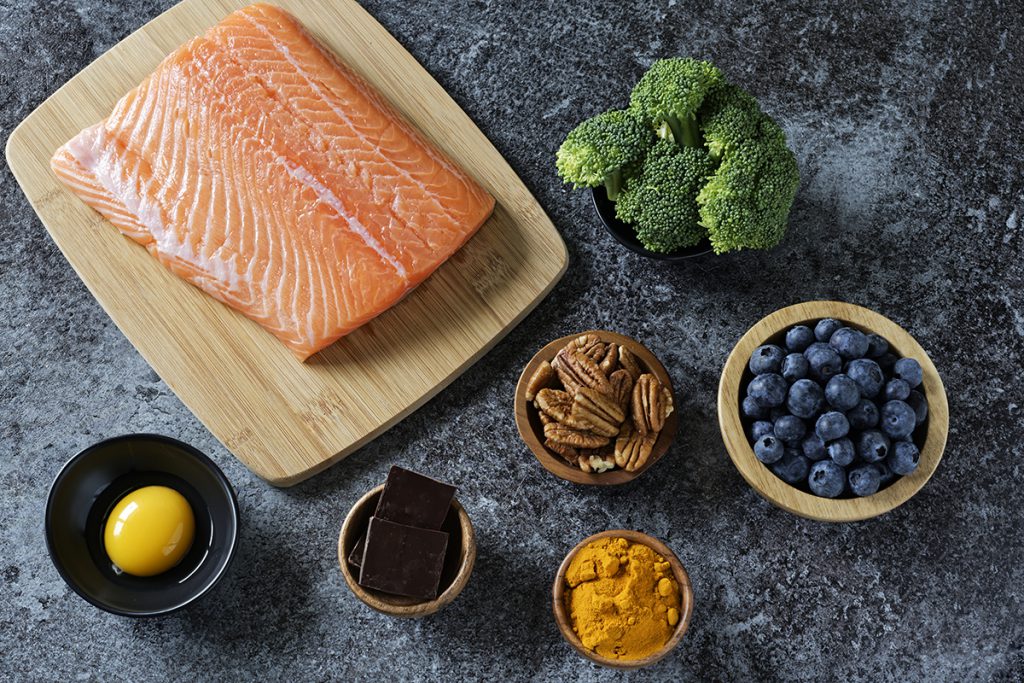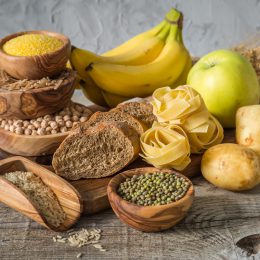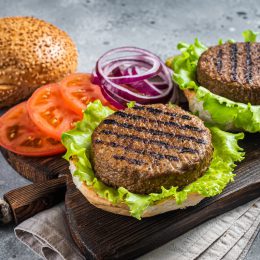8 Delicious Ways to Eat Your Way to Better Brain Health
A growing body of research shows that how you eat may help keep your mind sharp. Here are 8 takeaways from the research.

It’s normal to experience the occasional “memory slip” — like forgetting where you put your keys. As you age, these slips can start to happen more often. But there’s lots you can do to keep your mind sharp.
A recent decade-long study found that people who had more healthy lifestyle factors had slower memory decline than those with less. The healthy lifestyle factors they looked at included things like exercising regularly, socializing, and doing “cognitive activities” like reading and puzzles.
Another lifestyle factor they looked at? A healthy diet. That’s right — you can add brain health to the long list of benefits of healthy eating. A growing body of research shows that certain nutrients and eating patterns are linked to a lower risk of cognitive decline and dementia.
And it’s never too late to make changes to the way you eat to help keep your brain performing well. Here are 8 delicious ways to get started.
Healthy eating and fitness go together! SilverSneakers classes and events are happening right now at participating gyms, online through SilverSneakers LIVE, and at community centers near you. Activate your free online account to get started.
1. Try the MIND Diet
This brain-healthy eating pattern is a hybrid of the Mediterranean diet and DASH diet (Dietary Approaches to Stop Hypertension). It stands for “Mediterranean-DASH Intervention for Neurodegenerative Delay.”
The MIND diet focuses on food groups that research shows can help protect against age-related cognitive problems like Alzheimer’s disease. The diet can also help lower blood pressure, which is a risk factor for Alzheimer’s disease.
The MIND diet encourages eating more of these food groups:
- Beans: 3 servings a week
- Berries: at least 2 servings a week
- Fish: 1 serving a week
- Leafy greens: at least 6 servings a week
- Other vegetables: at least 1 serving a day
- Nuts: 5 servings a week
- Olive oil: use as your primary added fat
- Poultry: 2 servings a week
- Whole grains: at least 3 servings a day
And it recommends eating less of these foods:
- Pastries and sweets: less than 5 servings a week
- Red meat: less than 4 serving a week
- Cheese and fried foods: less than 1 serving a week
- Butter: less than 1 tablespoon a day
Recommended reading: How to Keep Your Brain Healthy: The SilverSneakers Guide
2. Go Big on Green
Here’s another reason to get your greens: leafy green vegetables, like spinach, kale, and lettuce, have been linked to slower age-related cognitive decline.
Certain antioxidants in leafy greens, particularly lutein and beta-carotene, may be responsible for their brain-boosting powers. One study in Frontiers of Aging Neuroscience found that older people with higher levels of lutein had neural responses that were on par with younger people.
Other science has discovered that greater intakes of both lutein and beta-carotene can lower the odds of moderate or poor cognitive function in women as they age.
So think green when you are making salads and sandwiches. You can also add handfuls of greens to soups, scrambled eggs, and even smoothies.
3. Crack an Egg
When it comes to our brains, choline is a nutrient you certainly don’t want to skimp on. This essential nutrient is the building block for a compound called acetylcholine, which regulates memory and helps your brain cells communicate properly.
Research published in the American Journal of Clinical Nutrition suggest that eating more choline is linked to a lower risk for dementia and better overall cognitive performance.
Eggs, more specifically the yolks, are just about the richest source of choline in the supermarket, second only to beef liver. A single egg delivers about 30 percent of your daily need for brain-benefiting choline.
If you’re worried about the cholesterol in egg yolks, you may not need to. Dietary cholesterol may have less of an impact on blood cholesterol than scientists originally thought. But talk to your doctor if you have concerns.
Recommended reading: 8 Things You Don’t Know About Cholesterol, but Should
4. Scale Back Ultra-Processed Foods
Cutting back on packaged foods and fast foods like pastries, sugary drinks and French fries could benefit your brain. These so-called “ultra-processed foods” are high in added fats, sugar, and salt, and low in healthful protein and fiber.
A recent large-scale study found that replacing just 10 percent of ultra-processed foods in your diet with less processed foods — like fruits and vegetables — was associated with a 19 percent reduction in dementia risk.
5. Sprinkle in Chia Seeds
Working more soluble fiber into your daily diet may help ward off cognitive decline. A 2022 study discovered that people who consumed the most dietary fiber, and specifically soluble fiber, were at a lower risk of developing debilitating dementia.
Scientists aren’t exactly sure why soluble fiber seems to protect the brain. Soluble fiber can help lower blood sugar and cholesterol levels, which in turn is good for your brain. It might also have something to do with the gut-brain connection. Fiber encourages the growth of beneficial bacteria in your gut microbiome. And those beneficial bugs may be good your brain, too.
One easy way to get more soluble fiber is with chia seeds. They have a whopping 10 grams of fiber in each 2-tablespoon serving. That’s about half the fiber you need in a day. You can add chia seeds to oatmeal, salads, smoothies and yogurt. Other sources of soluble fiber include beans, oats, barley, apples, pears, and flax.
Subscribe to our newsletter
It's quick and easy. You could be one of the 13 million people who are eligible.
Already a member? Click to discover our 15,000+ participating locations.
Follow Us
6. Up Your Magnesium Intake
Nutrition surveys suggest that most adults don’t eat nearly enough magnesium, which could contribute to poor brain functioning.
One 2023 study in the European Journal of Nutrition suggests that increasing magnesium intake could lead to less age-related brain shrinkage. And that in turn is linked to better cognitive function and lower risk or delayed onset of dementia in later life.
The anti-inflammatory effect of magnesium might be responsible for its brain benefits. Magnesium-rich foods you can include in your diet are dark chocolate, nuts, pumpkin seeds, avocado, beans, whole grains, banana, fatty fish like salmon and dark leafy greens.
7. Be Berry Good
Berries deserve a special mention in a brain-healthy diet. Options such as blueberries and strawberries are especially rich in flavonoids. These are plant compounds shown to help lower the risk for age-related cognitive decline.
At this point, we don’t have enough evidence to say how many berries a person needs to eat to have a brain benefit. But the MIND diet recommends getting at least 2 servings a week of the juicy sweet fruit.
8. Go Fish for Salmon
Getting more vitamin D from foods may help lower your risk of dementia. That’s according to a study published in the journal Alzheimer’s & Dementia. It found that people ate the most vitamin D-rich foods were less likely to develop dementia compared to those who ate the least.
There aren’t many good food sources of vitamin D, but fatty fish like salmon, sardines, herring and mackerel are among the best. As a bonus, these swimmers also supply omega-3 fats that may provide additional brain health benefits.
See our sources:
Study on healthy lifestyle and memory in older adults: The BMJ
The MIND Diet: Harvard School of Public Health
Leafy greens linked to slower age-related cognitive decline: National Institute on Aging
Study on lutein and brain function: Frontiers in Aging Neuroscience
Study on carotenoids and cognitive function in women: The Journal of Nutrition
Study on choline and cognition: The American Journal of Clinical Nutrition
Study on ultra-processed foods and cognitive decline: JAMA Neurology
Study on fiber and dementia: Nutritional Neuroscience
Study on magnesium and brain health: European Journal of Nutrition
Study on flavonoids and cognitive decline: Neurology
Study on vitamin D and dementia: Alzheimer’s & Dementia
Check Your SilverSneakers Eligibility Instantly
SilverSneakers members can go to thousands of gyms and fitnes
s locations across the nation, plus take SilverSneakers LIVE online classes — at no additional cost. Check your eligibility instantly here.
Already a member? Get your SilverSneakers member ID and exclusive fitness content by activating your online account here.
Not eligible for SilverSneakers? You can still get 200+ free SilverSneakers On-Demand videos and stay in touch with us by creating your online account.





